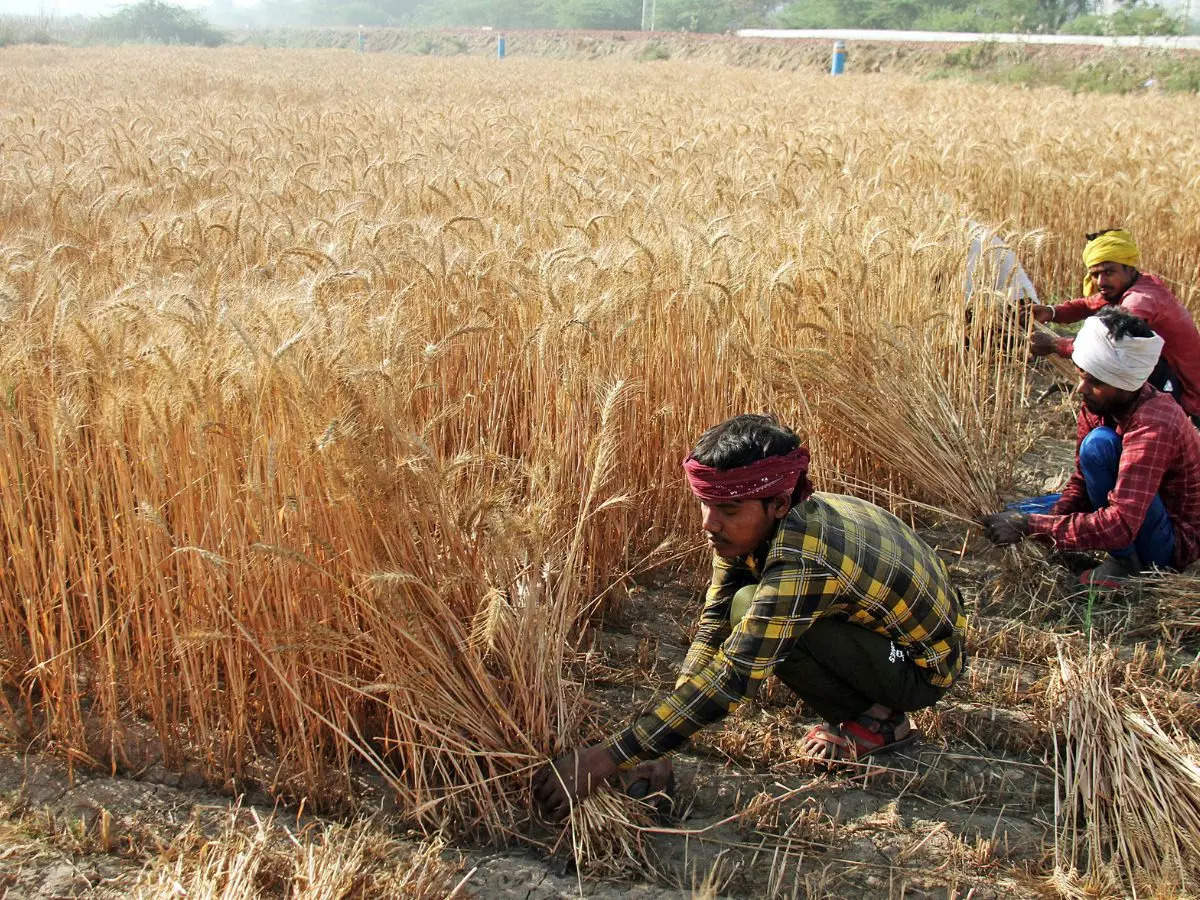
[ad_1]
One of many causes behind Pakistan nonetheless being depending on imports to satisfy home necessities is its failure to develop indigenous sorts of climate-resilient seeds.
Presently, the harvesting of wheat crops is underway in each nations. India has projected wheat output to the touch a brand new file of 114 million tonnes within the 2023-24 crop yr (July-June), whereas Pakistan has set an bold goal of 32.2 million tonnes from an space of 8.9 million hectares.
Whereas the 2 nations have been going through the opposed affect of local weather change on wheat crop since 2010 onwards, the present yr has been exceptionally beneficial as there have been no occasions of terminal warmth waves nor unseasonal rains affecting the crop.
“Local weather has been beneficial this yr. Through the essential interval of mid-January and February, there have been no incidents of sudden warmth waves, unseasonal rains, and lodging. We expect a bumper crop,” ICAR-Indian Institute of Wheat and Barley Analysis (ICAR-IIWBR) Director Gyanendra Singh instructed PTI.
He highlighted that climate-resilient wheat varieties have been sown in additional than 80 per cent of the entire wheat space of 34.15 million hectares this yr due to the supply of newer seed varieties and in addition better consciousness amongst farmers. Out of 600 indigenous wheat varieties launched up to now in India, Singh stated as many as over 100 climate-resilient varieties are within the seed chain now. Round 14 new varieties have been launched within the present yr itself. Based on Naresh Kumar, Principal Investigator at ICAR’s Nationwide Improvements in Local weather Resilient Agriculture (NICRA), India is doing significantly better when in comparison with different nations in taking numerous agronomic measures similar to altering planting dates and short-duration varieties moreover selling raised mattress cultivation, sprinkler irrigation, and soil-water-nitrogen administration.
Wheat crop is very delicate to temperature will increase. Sizzling and unseasonal heat climate lower India’s wheat output in 2022 and 2023, resulting in a drawdown in state reserves.
It’s reported a 5.5 per cent lower in wheat yield throughout the previous 30 years (1980-2010) occurred as a consequence of a decadal temperature enhance of 0.13 diploma Celsius.
With additional predicted rise in temperatures, many research have reported a decline in wheat manufacturing on the earth.
Rajbir Yadav, wheat breeder and Principal Scientist at Indian Agricultural Analysis Institute (IARI), stated the climate-smart seed varieties that India has developed might be simply grown in Pakistan, Bangladesh and Nepal.
“It could match nicely in some areas as agro-climatic situations are the identical,” he stated. The state of affairs of wheat farmers in Pakistan is totally different regardless of sharing comparable agro-climatic situations for rising wheat.
Since 2021, Pakistan’s agriculture division has launched as many as 31 wheat varieties by way of worldwide collaborations to assist cultivated fields turn out to be extra productive, climate-resilient and disease-resistant.
Whereas Pakistan Agriculture Analysis Council (PARC) has acquired over 4,000 wheat germplasm varieties from numerous worldwide sources for analysis and utilization in nationwide breeding programmes, it has but to indigenously produce high quality seeds and species with the power to soak up local weather shocks.
Ejaz Rao, a progressive farmer from Bahawalpur, stated, “Pakistan’s agriculture authorities have failed to enhance seed high quality for over 20 years. The hybrid seeds from nations with totally different local weather current twin problem i.e. non-compatible with native agro-climatic situations and disease-carriers.
“Throughout late twentieth century, a hybrid seed from US carried a pest, domestically named as “AmrikanSundi”, which couldn’t be eradicated,” Rao stated.
Stating that local weather change has necessitated adjustments in sowing and harvesting seasons, he steered adapting to new realities. “The supply of seeds, inputs, fertilizer and water have to be ensured on time to push back la nina and elnino results.”
Dr Zahir A Zahir, Professor of Institute of Soil & Environmental Sciences, College of Agriculture, Faisalabad, stated the College in collaboration with Washington State has developed and acclimatized germplasm, a hybrid seed selection, which requires much less water and offers extra yield.
“Pakistan has turned from web exporter of wheat to web importer of wheat in a brief interval of simply 5 years, due to the formidable twin problem of local weather change and inhabitants explosion affecting in tandem,” says Mushtaq Ahmad Gill, Chief Government, South Asian Conservation Agriculture Community (SACAN).
Highlighting the significance of water amidst raging world warming, Gill who can also be former Director Normal of Water Administration, Punjab, Pakistan stated Pakistan sadly solely has water storage capability for 30 days.
“Half of the yr, we face drought, the opposite half, floods,” Gill stated and known as for growing water storage and saving treasured water value billions of {dollars} from going into the ocean yearly.
“We, the agricultural scientists and farmers from India and Pakistan, usually keep in contact with one another and maintain on-line/Youtube periods to profit from one another’s experiences. We change know-how, experience and merchandise to assist one another get optimum yields,” Gill stated, whereas stressing on the necessity to preserve common contacts.
Punjab’s Minister for Agriculture Syed Ashiq Hussain Shah dominated out any local weather affect on wheat crop. “We expect a bumper crop this yr.”
(This cross border story was achieved by Laxmi Devi Aere, Assistant Editor of stories company PTI, New Delhi, and Amer Malik, an investigative journalist with the Information Worldwide, Pakistan, as a part of the US-based East West Centre’s initiative on reporting points on mutual concern.)








